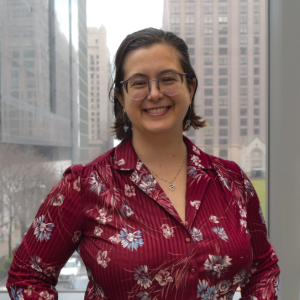
May 2024 Newsletter

May 2024 Newsletter

Faculty Profile
Leiszle Lapping-Carr, PhD, ’19 GME, is an assistant professor of Psychiatry and Behavioral Sciences in the Division of Psychology. Her clinical care and research focus on sexual and relationship health during the perinatal period. Her work uses mixed methods approaches to better understand the experiential aspects of the perinatal period, including mental health concerns, relationship functioning and sexual functioning.
What are your research interests?
My research interests are focused on the intersections and interactions of reproductive health with mental health and sexual health, especially for people that identify as part of the LGBTQ+ community. I am interested in better understanding the sexual- and mental health-related experiences of LGBTQ+ people during reproductive health events across the lifespan (e.g., going through puberty, trying to get pregnant, having a new child, going through hormonal changes like menopause or initiating hormone replacement therapy). Using this knowledge, I hope to develop evidence-based screening and measurement tools, new or adapted interventions and eventually trainings for clinicians.
What is the ultimate goal of your research?
Most reproductive and sexual health research is very centered on the experience of cisgender and heterosexual individuals, and I would like to create approaches to help people through challenges in these areas that are both applicable and affirming for sexual and gender diverse populations. I would also like to increase the overall knowledge base of medical and mental healthcare professionals in sexual and reproductive health and in offering LGBTQ+ affirming healthcare. These topics are cut across populations and presenting problems, and there is currently a lack of training in both medical and mental health disciplines.
How did you become interested in this area of research?
I’ve been interested in sexual health since I was an undergraduate student and learned it was something that psychologists could study. As I progressed in my training, I noticed the sexual health experts often knew very little about reproduction, and the reproductive health experts often knew very little about sexuality. I also discovered, upon preparing a class presentation, that there was very limited research done in sexual or reproductive health with people who identify as LGBTQ+. These seemed like major gaps in our research and clinical knowledge. As a certified sex therapist, and as perinatal psychologist, it really is the intersection of my clinical and research expertise. I am personally passionate about these issues as a queer woman who has given birth to two kids.
How is your research funded?
My research is funded through a career development grant (K23) from the National Institute on Minority Health and Health Disparities. This funding will enable the adaptation of an evidence-based preventive perinatal depression intervention for the LGBTQ+ population, which we will call Parents and Babies.
Where have you recently published papers?
I’ve had four articles published over the past year, each in a different journal. I wrote about the impact of stress and trauma on sexual health in Obstetrics and Gynecology Clinics of North America, the importance of careful methodology for introspection in the Journal of Consciousness Studies, perinatal depression screening among sexual minority women in JAMA Psychiatry, and how stress and depression are associated with sexual and relationship health in men who have sex with men in Archives of Sexual Behavior.
Who inspires you? Or who are your mentors?
I have an amazing group of mentors that have supported me throughout my career development. Dr. Chris Heavey, Dr. Russ Hurlburt and Dr. Noelle Lefforge were hugely impactful in my initial training in research methodology and as a clinician during graduate school, really fostering my ability to think critically about our field and not be afraid to talk about problems. Dr. Richard Carroll, Dr. Sheehan Fisher, Dr. Suena Massey and Dr. Sophie Bergeron helped me to develop my area of specialization and consider how my personal and professional values can be in line and in balance. Dr. Darius Tandon, Dr. Katherine Wisner, Dr. Michael Newcomb and Dr. Lori Ross are all current mentors on my career development award. They have been supporting me in my transition to an independent, federally funded investigator, and all the challenges that come with an academic career. I feel incredibly lucky to have been on the receiving end of such great mentorship, and I hope I am able to pass it on to future generations of clinicians and scientists.